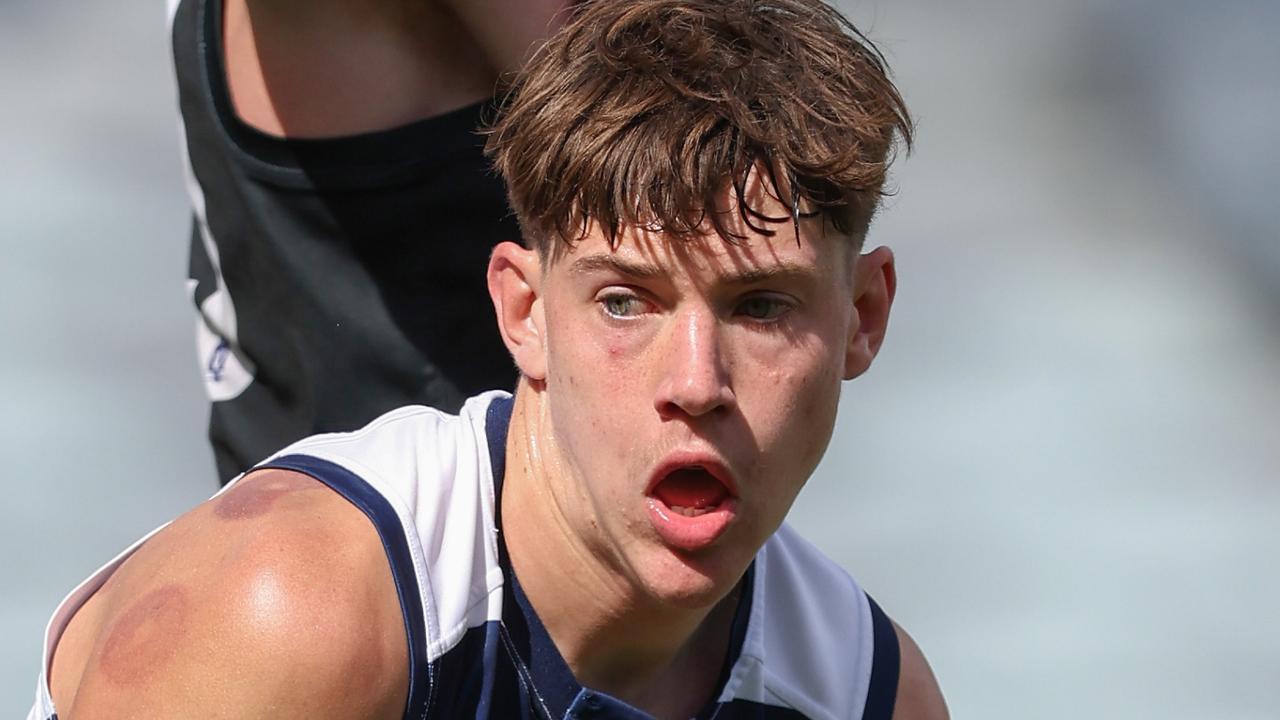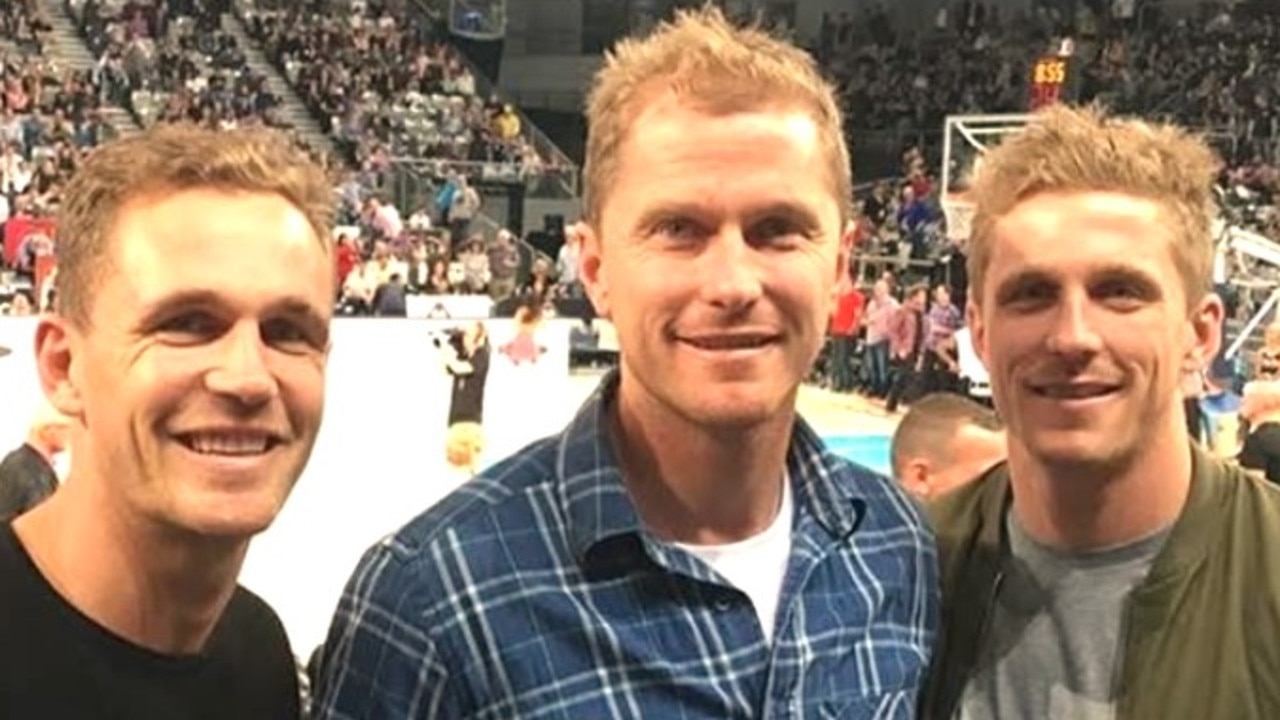Geelong master recruiter Stephen Wells and key Cats figures reflect on his 40 years at the Cats
Stephen Wells began at the Cats 40 years ago, and plenty of success has followed. In a rare interview, Wells open up on his journey and key Cats figures reveal what sets him apart from the rest.
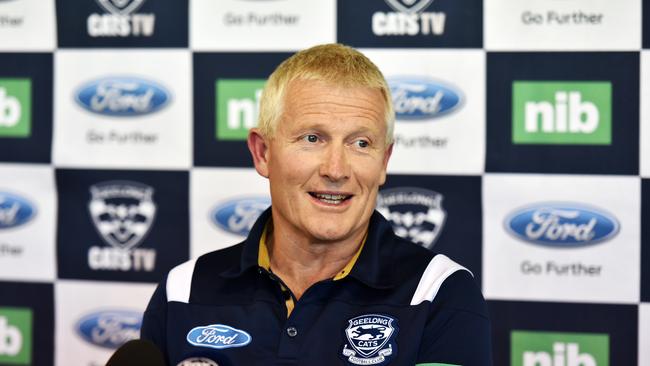
Geelong
Don't miss out on the headlines from Geelong. Followed categories will be added to My News.
Geelong master recruiter Stephen Wells quietly celebrated 40 years at the Cats in 2024.
But the talent spotter’s eye is still as sharp as ever.
Shaun Mannagh and Lawson Humphries joined Geelong as mature-agers in last year’s draft and proved to be revelations in the back-half of the season.
It is left-field selections like these – and there are countless examples – that have characterised Wells’ time at Geelong since he was appointed as recruiting manager in 1995.
AFL talent ambassador Kevin Sheehan has long admired Wells’ ability to look outside the square, pointing out selections like six-time All-Australian Corey Enright at pick 47 and 21-year-old draftee Matthew Stokes at 61.
Sheehan feels there may not be anyone better at extracting talent from untraditional avenues.
“We run a very rigid, three tiered program where you see kids and under 16 level, under 17 futures, you’ll see a fair bit there, under-18 nationals, and everyone’s watching all that,” Sheehan said.
“That’s inside the square if you like, he looks outside of that again to see what we’re missing.
“He’s still looking and following through guys that have shown him something at the start, but then for various reasons wasn’t chosen, but he gives people a chance to improve and looks again and looks again.
“Don’t do what everyone else is doing, do a bit more, because you just can find a hidden gem.”
What does the humble Wells think about his reputation of plucking players out of nowhere — affectionately known as a ‘Stephen Wells special’?
STEPHEN WELLS’ TOP 40 DRAFT GEMS RANKED
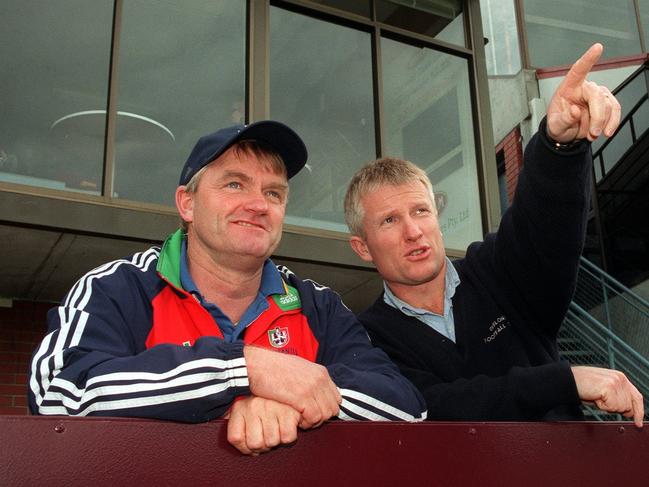
“I know we do the work, our whole recruiting team – whether that be volunteers or full-time staff – do the work and try to be all over any potential players,” Wells said.
“We would love to give more players an opportunity, but list sizes and recruiting doesn’t work that way.
“Every draft is important and we value every pick – whether it be the first pick we have in the draft or the last pick we have in the rookie draft.
“It’s just so important to try and bring in players that are going to make the most of an opportunity – and we need to complement what we’ve already got at the club every time we make a decision.”
Wells doesn’t like to individualise or rank drafts over others, and perhaps that’s why he is has been so successful for so long.
He sees the good in prospects, rather than their flaws, and is extremely thorough in his process in finding the best fit for the Geelong Football Club.
Current Geelong football boss Andrew Mackie was drafted by Wells as a left-field top-10 selection in 2002 and then joined the Cats’ recruiting team in 2018.
Now Wells’ boss, Mackie is still learning from him.
For Mackie, the experienced scout’s open-mindedness and ability to trust his gut stands out.
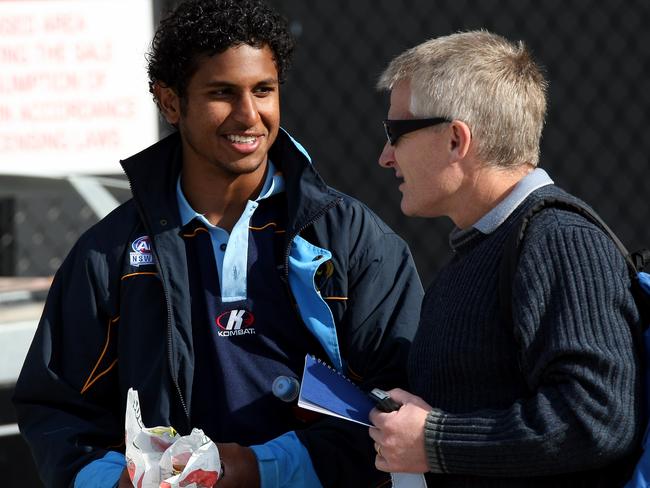
“I think the skill to just keep going back to what the player can do and not other things that pop up where that starts to weigh in on the decision,” Mackie said.
“If he’s seen a player do something once, he never forgets that and keeps coming back to it.
“The hardest thing to capture in all this sort of stuff for the really good ones is there’s an intangible to it.
“It’s sort of a melting pot of a lot of things in his head that he’s worked through over the years as to why he thinks that the player could really work for us. And part of that is who we are as a club and part of that is his feel on the player.”
Wells doesn’t like to toot his own horn. He believes key figures at the club have helped him last as long as he has and that he is learning every day on the job.
Former Geelong football boss Neil Balme said that Wells, who he worked alongside through their premiership era, put in the hard yards and was trusted by their group.
“He wasn’t running around blowing his own trumpet about what was going to happen,” Balme said.
“He just quietly went about his business, he really worked very hard. He saw everyone play and listened to the people who worked for him, but he didn’t say all that much.
“But there’s no doubt that by the time it came to either trading or drafting or whatever, he had a very good feel for what he felt we needed.
“He always had a good relationship with the coaches to find out what they needed and then tried to put that back into what he could find and what the sort of players were.
“It’s always still a team thing but he did have a good record and we really did genuinely trust him. So you’ve got to trust his judgement at some stage.”
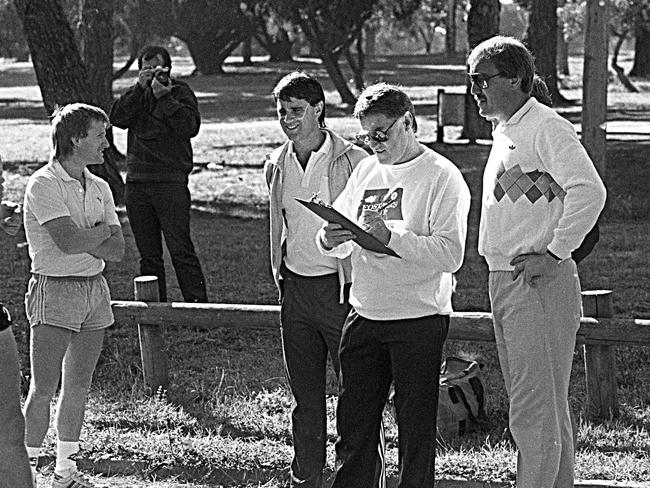
HOW IT BEGAN
Wells’ recruiting journey began before the draft came into being in 1986.
In 1984, Wells took on the role as Geelong’s country zone coach and development officer in Echuca.
Wells had played a couple of years in the SANFL himself for West Adelaide and at Geelong West in the VFA.
It was in the SANFL where he came to the attention of Balme, coach of Norwood at the time.
“I knew who he was, but I didn’t realise what he was going to do. That’s the first time I saw him, and then I worked with him from 2007 for eight years,” Balme said.
Wells chipped away in the country zone and then their metropolitan zone before learning first-hand under Geelong recruiting manager and premiership player Bill McMaster – the man who discovered Gary Ablett Sr.
“Bill was enormously important. I’m sure I wouldn’t be here without Bill’s support over that time,” Wells said.
“I’ve been very lucky, I’ve had great support from the leaders at the club. Whether it be the board or the individual presidents, the CEOs, the footy managers and the coaches. Obviously been able to work well with all of those people that have been there for the same time as I have.”
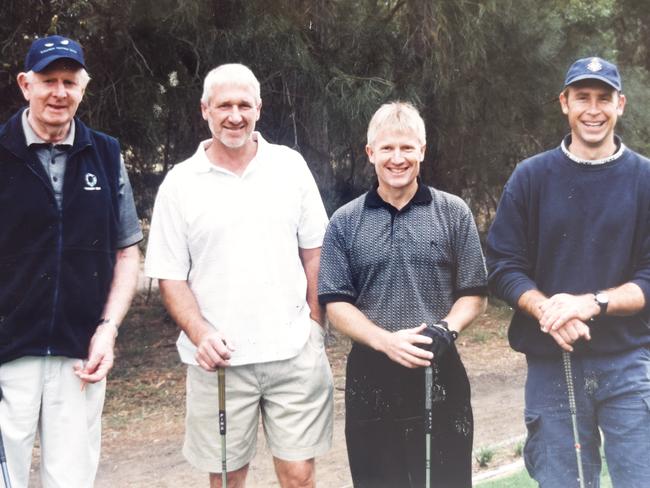
However, McMaster says Wells would have been just fine without him.
“That probably is a bit of a furphy, he didn’t need much help from me. He was his own man,” McMaster said.
“He’s a wonderful recruiter because he is a wonderful bloke. He obviously knows a footballer.
“It has been a very pleasant surprise that he has done what he’s done. We got on very well together and we’d watch games pretty much all over Australia.”
Although the two didn’t always agree. There was one player who McMaster raved about at one game, but he couldn’t convince Wells.
That young talent went on to be a Brownlow medallist.
McMaster noticed a quiet competitiveness about Wells – particularly on the golf course.
“He was off scratch at 13th Beach, that’s pretty good. He and (Garry) ‘Buddha’ Hocking used to play golf against one another, and it was like World War II,” McMaster said.
“They really went at one another and Buddha was going to beat him and Wellsy wouldn’t let him beat him.”
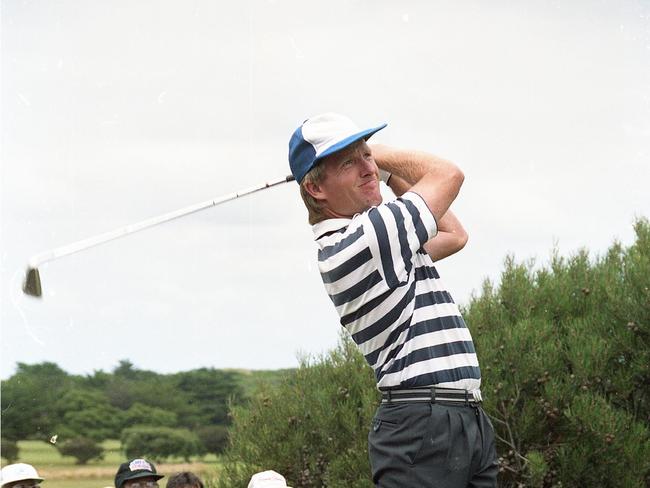
Former Geelong player and administrator Neville Bruns was the man who appointed Wells as recruiting manager in 1995 along with new coach Gary Ayres.
Mentored by McMaster, Wells was the obvious candidate.
“It was probably his quietness, but his thoroughness. It wasn’t a bloke like me who just, ‘blurp’, talks,” Bruns said with a laugh.
“You could see him thinking on anything that you asked him and he would he hesitate a bit and then he would give you the answer. So he is very calculating and I suppose from that I thought well, this guy’s going to sit back and approach people and families in the right way that will help bring people to the club.
“I’ve known some recruiting people prior to Stephen that were very gung ho and they only last a short time and they move on.
“Whereas Stephen just sits in the background, very good, very humble, very proud family man and very proud Geelong person. And he’s done a terrific job.”
Over the past three decades he has worked as list boss and football boss at different stages, but his primary focus has been on recruiting Geelong future stars.
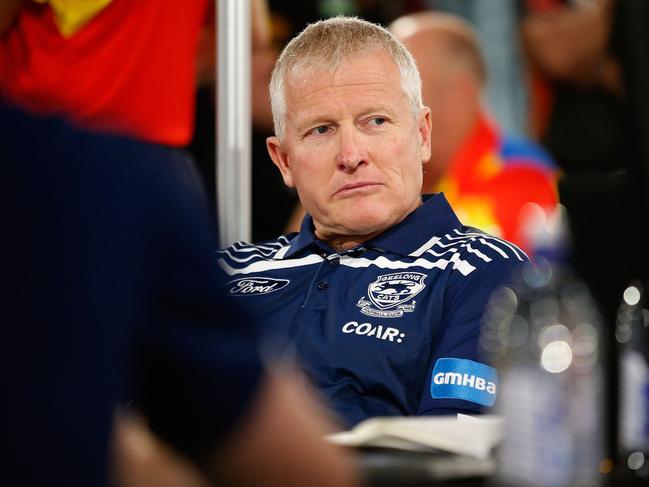
HIS LEGACY
In 1999, Wells drafted Joel Corey (pick 8), Paul Chapman (31), Cameron Ling (38), Corey Enright (47) and two years later Jimmy Bartel (pick 8), James Kelly (17), Steve Johnson (24), Gary Ablett Jr (40, father-son) followed.
Those eight players were the nucleus of Geelong’s three premierships in 2007, 2009 and 2011.
It wouldn’t be fair to say Wells alone was behind those flags, but he certainly was pivotal.
“We would have had another recruiting bloke and he might have been just as good, but we’re never going to know that and he’s managed to do it for a damn long time and he’s done a very good job,” Balme said.
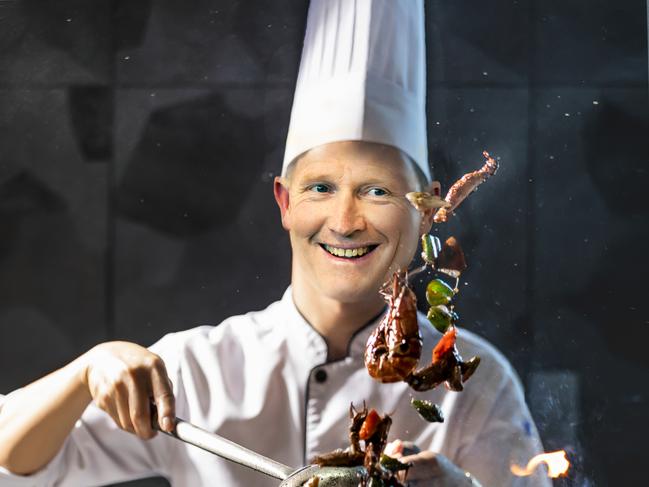
Since then a lot of his success has come without early selections.
Geelong’s 2016 draft haul was case in point. Brandan Parfitt (26) and Tom Stewart (40) were taken in the national draft and Jack Henry and Zach Guthrie as rookies.
All four went on to play in the Cats’ 2022 premiership win.
Away from the club, Wells has also had a marked impact.
One of the founding fathers of the draft in the eyes of Sheehan, Wells’ background in development helped form what is now known as the Coates Talent League in 1992.
“From our point of view, the AFL’s, he’s one of the trusted voices. He and whether it be Graham Wright, Scott Clayton, Kinnear Beatson, these sorts of people have been around a long time. Noel Judkins from way back, John Beveridge,” Sheehan said.
“They were our eyes and ears who were out there watching football around Australia from week to week, and we had to listen to their feedback.
“And that helped us, not just sometimes select the right squads that we put into programs, but also come up with the right program and would adjust things if needed based on the feedback that we’d get from people like them.
“They helped us build a pretty productive pathway over a long period of time. And the set-up of the Coates Talent League was working in conjunction with those clubs, including Steven Wells, and that was in 92.”
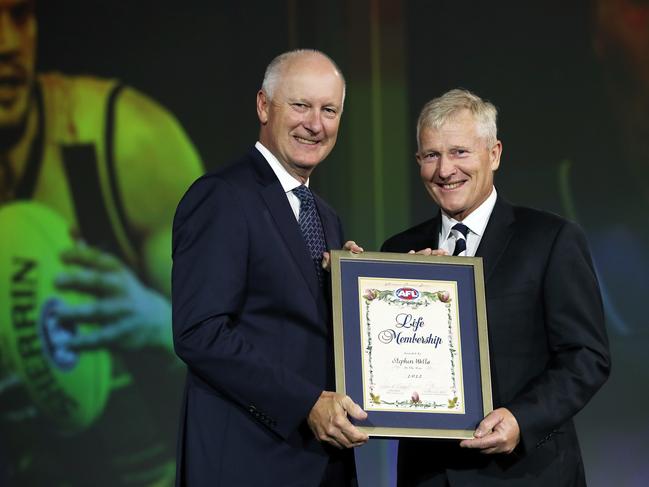
HOW LONG LEFT?
Wells still gets a kick out of recruiting, and wouldn’t be a surprise to see him reach half a century with the Cats.
Two things in particular keep him coming back: seeing the players he select grow, and the pursuit of another flag.
“One is seeing people make the most of an opportunity that comes their way, what is often their dream of being an AFL player. So seeing them develop as footballers and players,” Wells said.
“But that’s all part of just us trying to win games of footy and give ourselves a chance to be premiers.
“(It is the) end of my 41st season, we have played in 19 preliminary finals in that time, 10 grand finals and won four of them so it is a bit of a numbers game.”
Plenty has changed in three decades – stats, vision of every game and enhanced budgets – but Wells has no sense of groundhog day.
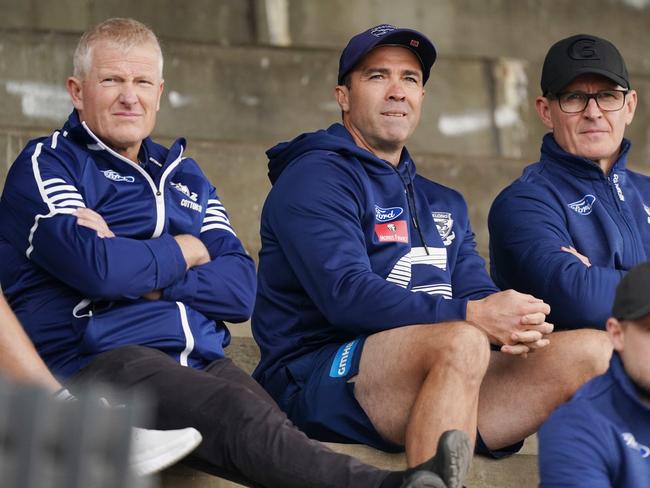
“I love my job, I’m very, very privileged and grateful to have worked in the industry for so long. How lucky am I to be watching footy for a living,” Wells said.
“It’s a dynamic environment and as a person closer to the end of the start of my career, I’m so lucky I can go in every day and I’m working with young people.
“I work with people who have got fantastic new ideas and new ways of looking at things. And the great thing about footy is every year is a new year.
“Even though it is the same thing over and over again, there’s exciting opportunities ahead at the start of each season and it won’t just be up to me, how long I go, it’s up to my bosses as well.”
Take it from his boss: his job looks relatively safe for now.
“He’s still very sharp. He’s got a real energy and drive to make the club better and really help our list in the job he does,” Mackie said. “He’s got plenty of time left.”
More Coverage
Originally published as Geelong master recruiter Stephen Wells and key Cats figures reflect on his 40 years at the Cats




